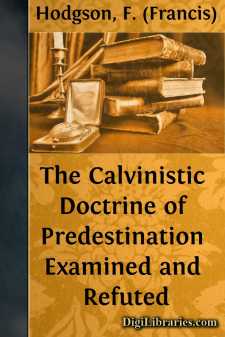Categories
- Antiques & Collectibles 13
- Architecture 36
- Art 48
- Bibles 22
- Biography & Autobiography 813
- Body, Mind & Spirit 142
- Business & Economics 28
- Children's Books 17
- Children's Fiction 14
- Computers 4
- Cooking 94
- Crafts & Hobbies 4
- Drama 346
- Education 46
- Family & Relationships 57
- Fiction 11829
- Games 19
- Gardening 17
- Health & Fitness 34
- History 1377
- House & Home 1
- Humor 147
- Juvenile Fiction 1873
- Juvenile Nonfiction 202
- Language Arts & Disciplines 88
- Law 16
- Literary Collections 686
- Literary Criticism 179
- Mathematics 13
- Medical 41
- Music 40
- Nature 179
- Non-Classifiable 1768
- Performing Arts 7
- Periodicals 1453
- Philosophy 64
- Photography 2
- Poetry 896
- Political Science 203
- Psychology 42
- Reference 154
- Religion 513
- Science 126
- Self-Help 84
- Social Science 81
- Sports & Recreation 34
- Study Aids 3
- Technology & Engineering 59
- Transportation 23
- Travel 463
- True Crime 29
The Calvinistic Doctrine of Predestination Examined and Refuted
Categories:
Description:
Excerpt
DISCOURSE I.
“In whom also we have obtained an inheritance, being predestinated according to the purpose of him who worketh all things after the counsel of his own will.”—Eph. i. 11.
It would very naturally be expected of a preacher, selecting this passage as the foundation of his discourse, that he would have something to say upon the subject of predestination. It is my purpose to make this the theme of the occasion; and this purpose has governed me in the selection of the text. The subject is one of great practical importance. It relates to the Divine government—its leading principles and the great facts of its administration. Some suppose that the Methodists deny the doctrine of Divine predestination, that the word itself is an offence to them, and that they are greatly perplexed and annoyed by those portions of Scripture by which the doctrine is proclaimed. This is a mistaken view. We have no objection to the word; we firmly believe the doctrine; and all the Scriptures, by which it is stated or implied, are very precious to us.
There is a certain theory of predestination, the Calvinistic theory, which we consider unscriptural and dangerous. There is another, the Arminian theory, which we deem Scriptural and of very salutary influence. My plan is, first, to refute the false theory; and, secondly, to present the true one, and give it its proper application.
My discourse or discourses upon this subject may be more or less unacceptable to some on account of their controversial aspect. This disadvantage cannot always be avoided. Controversy is not always agreeable, yet it is often necessary. Error must be opposed, and truth defended. What I have to say, is designed chiefly for the benefit of the younger portion of the congregation. I feel that there devolves upon me not a little responsibility in reference to this class of my hearers. Many of them, I am happy to learn, are eagerly searching for truth, and they have a right to expect that the pulpit will aid their inquiries, and throw light upon their path.
The theory of predestination to which we object affirms that God has purposed, decreed, predetermined, foreordained, predestinated, whatsoever comes to pass, and that, in some way or other, he, by his providence, brings to pass whatever occurs.
The advocates of this doctrine complain loudly that they are misunderstood and misrepresented. The Rev. Samuel Miller, D. D., late of Princeton College, N. J., in a tract on Presbyterian Doctrine, published by the Presbyterian Board of Publication, complains thus: “It may be safely said that no theological system was ever more grossly misrepresented, or more foully and unjustly vilified than this.” “The gross misrepresentations with which it has been assailed, the disingenuous attempts to fasten upon it consequences which its advocates disavow and abhor; and the unsparing calumny which is continually heaped upon it and its friends, have scarcely been equalled in any other case in the entire annals of theological controversy.” “The opponents of this system are wont to give the most shocking and unjust pictures of it....


